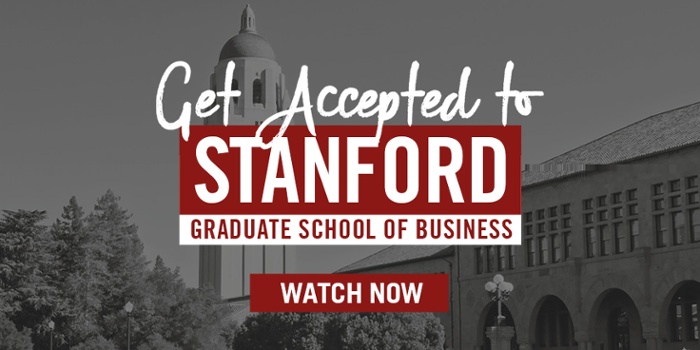By Paul Lanzillotti,
Amerasia Consulting GroupIf you read the latest editions of our “
How to Apply to Harvard Business School” and "
How to Apply to Stanford GSB[/b]" guides, you already know that cultivating a real reason for applying to an elite MBA goes week beyond the school's name, rank, and prestige. But more than any other MBA program in the world (yes, even HBS), GSB looks beyond having a great GMAT score, a summa cum laude GPA and a blue chip name as your employer. While these are respectable measures of a person’s perceived worth, they are not good enough reasons to apply to GSB.
Why is this? Simply put, you could someone with a mis-calibrated moral compass or worse, what your colleagues might call an "
asshole" (more on the asshole test
here and the true cost of being an asshole
here). That's right - more than any other school in the world, Stanford has a visceral aversion to those who define themselves by their accomplishments, as opposed to the innate values and beliefs that drive those accolades. Apparently,
Stanford has their pick of the litterand they can afford to stand absolutely resolute in their aversion to those whose moral compass points true south.
Take a look at GSB’s first essay question “What matters most (to you and why)?” Not only is this prompt require you to be introspective, but it also requires you to hit on 750 or so words that overwhelmingly attest to non-professional content. And that is just where the fun begins. For those of you who define yourself (in this essay) by laying out a series of professional and personal professional accomplishments, you will most likely run out of meaningful things to say. When I read misguided Stanford essays, I see it all the time. The essay either becomes some type of "super resume" (AKA "**** the adcom already knows or can assume") or a meandering narrative filled with clichés and pipe dreams. Stanford admissions has often said that
no one can tell your story is genuinely as you can. I suppose writing it is another matter altogether.
What Stanford wants to see is a person who genuinely discusses (maturity and thus authenticity is key here) why they did something, and what they learned from it. As opposed to simply how accomplished some feat or what they did to earn some type of employee of the month/year/century award. It is not as simple as Stanford wanting "nice" people. You certainly have to be successful, as successful as anybody applying to Harvard, for example. It is just that Stanford really focuses on applicants who are actually successful because they are guided by an unwavering moral compass. They want people who are successful professionally as a subset of being successful as a person. Ultimately, I believe that this is the key differentiator between what Stanford GSB wants and what HBS seeks.
Do not get me wrong, HBS definitely vets the character of the people that they are admitting. But I would say that HBS believes the ultimate proof (of what you bring to their table and future tables) is in the pudding - what have you led, what have you accomplished, and it better be good, better than the rest. Whereas Stanford GSB focuses first on the moral fabric of a person. They believe it should never tear, and the truest test of that moral fiber is by overcoming obstacles that threaten to tear apart a person's values and beliefs.
Now not everybody with excellent moral character will be eligible for a seat at Stanford GSB. I do not want to oversimplify this. But I believe that GSB would argue "how can anybody really be successful in life, if their values are suspect? You cannot fake your values over the long-term, and that is who we are looking for." And why are they looking for this person? Because you may have the brains and intellectual horsepower to achieve the type of goal that ultimately changes the world in a positive way. But do you actually want to do that? Or are you just writing some bullshit in your essays, trying to convince the reader you are the second coming of Mother Teresa?
I believe that any applicant who thinks that they can pull this off (trickery) as rather unsophisticated. I say this because I have seen a lot of Stanford essays. People who think they are too smart (for their own good) still try. I've been doing admissions consulting work since 2007 and I still see it all the time. It is really hard to fake your way through 750 words that require you to connect what you have achieved, to what you have learned, to a sense of purpose - among all the other things that GSB wants to see from you in writing.
So what are some things you should think about when deciding to apply to Stanford? Do you believe that your current professional path is the result of who you are as a person? Who you are as a person (and thus what “matters most” in the end) is not necessarily a product of your professional experiences.[/*]
What about your future goals? Are they big, hairy and audacious goals? Can you state that you want to create change that has a significant impact in the world. Ya, holy **** is right.[/*]
Okay, I will give you that your ultimate goals may be "aspirational" enough on paper. I mean anyone can state that they want to jump over the moon and solve world hunger. Right? But are your goals rooted in your truest values and beliefs? Not only must they be rooted in your truest values and beliefs, but you have to explain how those values and beliefs were formulated. I mean, you can show a long history of these goals developing, right? I hope so.[/*]
Do you have a long history of professional and personal involvement that clearly displays what you purport to be your beliefs, which are the product of your moral compass? If you have not really been doing anything that demonstrates this, I recommend not applying.[/*]
[*]If you think you are going to manufacture experiences by recently signed up for something or just showing up once a month for 10 years (for some community volunteerism), you are either a Johnny-Come-Lately or a Cathy-Cursory, and well, I recommend not applying.[/*]
[*]Have you even been challenged in your life? I mean really challenged. I'm not talking about growing up poor or growing up with parents who did not love you enough. What I am talking about is this – have you ever had to make a freaking decision that cost you personally because you believed it was the right thing to do? I am sure many of you reading this have lost sleep over a tough decision. (That is not good enough BTW.) But have you lost friends, even family because you stuck to your moral compass? Have you had to give up your dream job to do the "right thing"? I am not talking about being self-righteous, I am talking about having the right moral compass and sticking to that when **** hits the fan, and hits hard.[/*]
And of course, by sticking to your moral compass, did you ultimately achieve a greater result? Of course this could be greater self-awareness, but it also has to be something tangible. Yes, Stanford GSB has to see real results - something significant enough that most people would define it as an accomplishment.[/*]
[/list]
I've helped a lot of clients get into Stanford and what I have learned is the product of this. I will get off my soapbox now, but this is what I believe that Stanford wants to see in its applicants because I have seen what works. They are not handing out Stanford MBA degrees like its bat day at Shea Stadium. They need to know you are going to use it in a meaningful way. So take this seriously - "Change people. Change organizations. Change the World." (That's Stanford motto BTW and if you don't know that ... well.) You should have already done the first two before applying. The Stanford MBA will help you achieve the third, but only if you're not an asshole. Ha.
If you would like to discuss whether or not Stanford GSB is the right school for you – email us at
mba@amerasiaconsulting.com or contact us at
www.amerasiaconsulting.com/contact.



 Feel free to ask me any questions that you may have at any point.
Feel free to ask me any questions that you may have at any point. 
 Add to My Schools
Add to My Schools
 Download table
Download table















